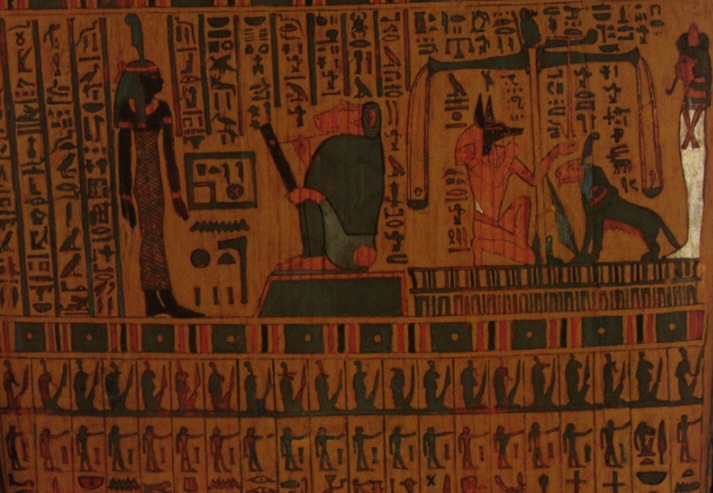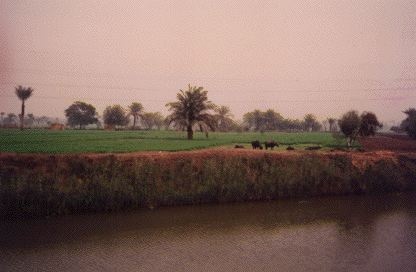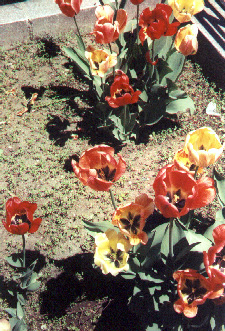 Stories
Stories Navigating the site:

The Judgment of Thamus
An ancient papyrus of the last judgment, found in lower Egypt.
Prelude | question | free writing | index
| words morph | ||||
The pyramids at Gizeh or Giza [date from 2400 B.C.E. ]; photo: J.V. Siry, 1989.
The coming of any new technology is strange – as dangerous as it is seductive – quiet, ever so silent that it feels so good when it arrives to settle in, we welcome it as a close –if not an old– friend.
Plato crafted a story in his dialog concerning the purposes of rhetoric about the origins of writing to enable him to speak of truth or the capacity to discern authenticity from appearances.
His story treats writing as an invention. He insists it is a new technology with certain unforeseen expenses that are not easily deciphered because the costs are masked by the benefits of the new technology.
How then can the appearances hide exactly what something is actually?
Postman, Technopoly,p. 3-20.
What did Thamus (King) decide to do & how is his decision about writing crucial to describing inventions?
Prelude | question | free writing | index
Does this story sound familiar?
Stories are important means by which people make sense out of what they experience, what they know or what other's tell them. All of us are story tellers. We explain important events by telling each other tales, or personal narrations of what we do. We even tell lies and tall tales. But telling a story is important.
Technopoly is the replacement of the traditional sources of authority, legitimacy and spirituality by material inventions, especially by machines and automation.
Prelude | question | free writing | index
the story
Thamus’ judgment is of the gifts presented to him as Egypt's King by Thoth (Mercury in Greek) or Theuth because he is the messenger of the Gods called "my paragon of inventors." (Postman, p. 4.)
p. 3
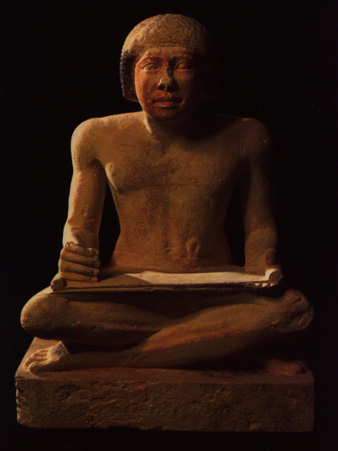
"few legends are more instructive than his"
Plato’s Phaedrus
Theuth: "Here is an accomplishment . . . which will improve both the wisdom and the memory of the Egyptians."
Thamus: "the discoverer of an art is not the best judge of the good or harm which will accrue to those who practice it."
Postman quotes Plato pp. 3-4.
Thamus’ error – writing is only a burden
“We may learn from this that it is a mistake to suppose that any technological innovation has a one-sided effect.”
Every technological is both a burden (price) and a blessing (opportunity)
pp. 4-5.
Wisdom and memory
writing is touted as a means to improve people's memory
Quite the opposite of its real function:
“cease to exercise their memory and become forgetful”
"They will rely on writing to bring things to their remembrance by external signs"
“your pupils will have the reputation for it without the reality”
But writing is instead a "recipe for recollection not for memory."
"They will receive a quantity of information without proper instruction, and in consequence be thought very knowledgeable when they are for the most part quite ignorant."
p. 4
Appearances versus reality:
without proper instruction
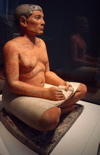 knowledgeable when quite ignorant
knowledgeable when quite ignorant
An Egyptian statue of a scribe (writer, or one who can write).
“Conceit of Wisdom”
“they will be a burden to society”
Thamus error – writing is only a burden
"Thamus does not repeat this error."
p. 5
Lesson One:
Every technology is both a burden (price) and a blessing (opportunity)
Every culture must negotiate with technology
pages 5-6.
Freud – child – phones – trains
and distance – comment on childhood,
childbearing and infant mortality
p. 6
What do we say of technology when it presents us with an improved means to an unimproved end!
p. 7
“There is a calculus of technological change that requires a measure of EVENHANDEDNESS”
The uses of technology are largely determined by the structures of the
technology itself
Thus "it’s functions follow its form:"
1. once a technology
tool or
technique is admitted
"it plays out its hand… it does what it was designed to do."2. Our task…To understand what that design is and what it does to us.
3. Change will alter what is meant by wisdom & memory
“wisdom will become indistinguishable from mere knowledge.”
3A: radical technologies create definitions, new meanings for old terms without our being fully aware let alone understanding it
3B: Insidious and Dangerous when we "are asleep at the wheel"
Examples of changes and radical tools: writing – printing –
radio – television -TV
p. 8
Eyes were open/ now they become shut
“…technology imperiously commandeers our most important terms.”
Truth, fact, intelligence, wisdom, authority, values, etc.
Technology (by analogy to written language) – redefines our reality:
p. 9
“all the words we live by.”
“We do not pause to ask…”
and does not pause to clue us in”
Principles to be mined from his critique and intent of Thamus
A. undeserved reputations
“authority of elites”
B. knowledge monopolies
Upended by new tools and these new tool complexes create monopolies of knowledge, practice and ability.New technologies do not equally reward winners and losers.
Some win many lose;
Who are losers? Blacksmiths lost out to mechanics – Automobile repair
p. 10
Computer Technology; has their widespread use altered the boundaries between power & freedom?
| beneficiaries | ||
|
elites |
vs. |
masses |
| capabilities | ||
|
centralized |
vs. |
dispersed |
Siren Song of Efficiency and Order
p. 11
The result is that certain questions do not arise
US – lust for what is new has no bounds
p. 12
American optimism is monocular – that is to say one sided, narrow – it blinds us to
facts
change is subtle – mysterious – unpredictable
Our patent American optimism is monocular – it causes us to overlook, ignore or forget crucial facts; this is the central warning of Thamus' Judgment in the dialogue of Phaedrus by Plato.
Thamus: “Come to rely on external signs not internal”
The roles of motives & “resources” becomes reversed.
Receive a quantity of information without proper instruction,
and as a consequence. . .
p. 4.
Warns that a massive ideological transformation is now underway
p. 12
Grades, the meaning and origin of
p. 13
William Fanish 1792, at Cambridge University, was the 1st graded paper!
New measures of performance are invented in the 18th Century.
A mathematical concept of reality is equal to IQ or the intelligence quotient. The measure of intelligence becomes a device, a tool for controlling people and influencing what they think of themselves.
Embedded in every tool is an ideological bias
p. 14
Wittgenstein argued that language is a vehicle and driver of thought
p. 15
unforeseen consequences stand in the way of those who think they see the new directions
p. 16
new elites with new tools and poor instruction as to meaning compete for time – attention – money
World View that is the way our society views the world is divided and this division generates "culture wars" over antagonistically different perspectives.
p. 17
reading vs. visual stimulation & oral vs. personal reading (classroom)
| oral tradition | written -- literate tradition |
|---|---|
song and dance |
print and reading |
End of a long standing truce between common (oral) and personal (quiet) reading aloud.
Reading made us individualists while the older, aural (oral) tradition made us social animals.
p. 18
A new technology changes everything – not really in a negative or positive way, not a good or evil change, but a decisive departure from what has gone before.
"Technological change is neither additive nor subtractive. It is ecological. I mean 'ecological' in the same sense as the word is used by environmental scientists."
"One significant change generates total change."
"This is how the ecology of media works as well."
The Printing Press –– "It changes everything."
ecology of media and resistance
pp. 18-19
T. S. Elliott and the use of poetry (content)
"to satisfy one habit of the reader, to keep his mind diverted and quiet. . ."
Analogy – the guard dog diverted from his /her task by a tasty piece of meat during a burglary
Therefore:
are our minds diverted while the soul is looted?
p. 19
will the computer raise egocentrism to the status of a virtue?
"We need to know in what ways it is altering our conception of learning, and how in conjunction with television, it undermines the old idea of school."
p. 19.
we are too diverted to notice the changes
p. 19
“To help us do this we have the judgment of Thamus, who…in his way
p. 20
What changes do inventions bring about in tools and tool complexes ?
- New technologies alter the character of our symbols: the
things we think with
- And they alter the nature of community, the arena in which thoughts develop
- We listen to and join the Thamus / Theuth conversation to revitalize it, to enliven the dialogue.
From – this author – we gain from this strange and dangerous story about new inventions, a hidden meaning. From Plato's personal recollection we can see a deep connection to a sense of loss veiled by the long past when literate societies replaced the aural and oral traditions.
∞
Notes
From Stanford University:
"Plato refers sometimes to the myths he uses, whether traditional or his own, as muthoi (for an overview of all the loci where the word muthos occurs in Plato see Brisson 1998 [141ff.]). However, muthos is not an exclusive label. For instance: the myth of Theuth in the Phaedrus (274c1) is called an ako? (a “thing heard”, “report”, “story”) . . ." from
Catalin Partenie "Plato's Myths" Stanford Encyclopedia of Philosophy,
First published Thu. July 23, 2009; substantive revision Thu. June 19, 2014.
Brisson, L., 1998, Plato the Myth Maker [Platon, les mots et les mythes], translated, edited, and with an introduction by Gerard Naddaf, Chicago: University of Chicago Press.
My comment -- J. V. Siry:
First: To every action there exists parallel, perpendicular and opposite reactions to consider, examine, explain, & analyze.
Second: That there exists a geometry of nature in which human thought is embedded.
Third: That we need to re-create meaningful discourse or conversation – a dialogue – about our moral precepts, ethical behavior, and social values.
This desirable conversation needs to be about who we are becoming as we utilize tools, especially new technological apparatus.
And the dialog may most likely include how we use tools to achieve our ends, especially when technology is changing rapidly!
Prelude | question | free writing | index
"Story of Thamus who judges Theuth 's inventions & some commentary on the myth's origins in Plato."
Neil Postman, Technopoly: The Surrender of Culture to Technology. New York: Random House, 1993.
![]()
Pursell | Pacey | Postman | Head | Eberhart | Snow | Kaku
 |
||
|---|---|---|
| Tools of Toil: what to read. | ||
| Tools are historical building blocks of technology. | ||

.gif)


